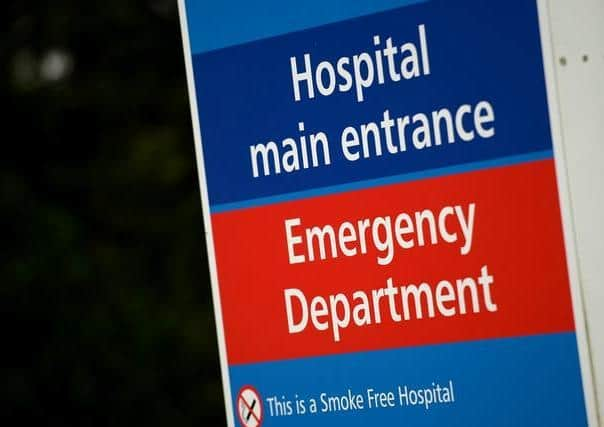Non-urgent A&E visits cost Milton Keynes Hospital more than £150,000 last year
and live on Freeview channel 276
The Royal College of Emergency Medicine said many people anxious about their health have "no alternative" but to turn to A&E for treatment, and added that pressures on emergency departments should not fall on the public.
NHS Digital data shows roughly 1,220 admissions had a primary diagnosis of "nothing abnormal detected" at Milton Keynes University Hospital NHS Foundation Trust in 2019-20.
These attendances cost the trust £174,800 over the period.


Advertisement
Hide AdAdvertisement
Hide AdThe NHS says A&E is for serious and life-threatening emergencies, with patients urged to call 111 over other urgent illnesses.
On hearing these statistics, Professor Joe Harrison, Chief Executive of Milton Keynes University Hospital, said: "It is really important that patients attend our Emergency Department (ED) only when it is necessary, and that is when there is a genuine life-threatening emergency.
"Attending our ED when emergency treatment is not required prevents our staff from being able to prioritise those patients who most need to be treated by the team. If you are in need of urgent care, it is strongly advised you contact NHS 111 first to discuss your symptoms. This is a free service available 24 hours a day, seven days a week.
"The Milton Keynes Urgent Care Centre (UCC) is available for urgent advice and treatment for illness, infections and injuries. The UCC is a 24/7 local walk-in centre on the hospital site which provides treatment for minor injuries like sprains and strains. It provides a doctor and nurse treatment service for urgent problems."
Advertisement
Hide AdAdvertisement
Hide AdBut Dr Adrian Boyle, vice president of the RCEM, warned there are "many reasons" why someone could attend an emergency department and then be discharged with no serious diagnosis made.
"They may attend because there is simply no alternative, or they are directed there by an external agency", he said.
Dr Boyle added: "If patients are unsure about attending A&E or if they have a non-life-threatening condition then they should call NHS 111 where they will be directed to the best care for their particular condition.
"But crucially patients won’t know the severity of their condition without clinical expertise or examination. Sometimes cases do show no abnormality and at those times we will discharge the patients appropriately.
Advertisement
Hide AdAdvertisement
Hide Ad"However, there are times when we do discover something serious and their attendance may save their life as we are able to swiftly provide appropriate treatment."
He said concern over pressures on A&E departments should not be shouldered by the public, adding that an "adequately staffed and funded" health service can meet patient and community demand.
Across all trusts in England which provided figures, £178 million was spent on 1.1 million non-urgent A&E attendances in 2019-20.
Sarah Scobie, deputy director of research at the Nuffield Trust health think tank, said despite A&E attendances dropping "significantly" during the pandemic, those with a listed diagnosis of ‘nothing abnormal’ did not fall any further than other admission types.
Advertisement
Hide AdAdvertisement
Hide AdShe said: "This suggests that they could not be helped elsewhere in the system or still felt that A&E was the most appropriate service for them."
Ms Scobie added that the NHS has made several attempts to divert patients with less serious conditions, including encouraging patients to use the 111 service.
"This process may reduce pressure on ‘front door’ services but is unlikely to reduce admissions to hospitals from those with an urgent need for care," she said.
At Milton Keynes University Hospital, sprains or ligament injuries were the most common issues in 2019-20 – for which a diagnosis was listed – accounting for 6,865 emergency episodes.
For more information on when to attend ED, please visit the NHS website.